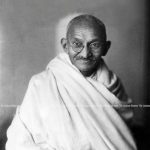Faiz in Lucknow
As a token of initiation Dhanpat Rai had whispered the gurbani qalma gayatrimantra to Faiz Ahmad Faiz on 10 April, 1936.
The occasion was the first conference of the Progressive Writers Association (PWA) in Lucknow that was inaugurated by Munshi Prem Chand. Faiz was 25 years old and he had traveled from Punjab with a one way ticket in his pocket to participate in the historic event.
And the sparks that flew that day was just the beginning of a life long romance between Faiz and Lucknow.
Lucknow became an obsession with Faiz after Dr. Rashid Jahan left Amritsar to live here. Faiz had greatly admired Dr. Rashid Jahan as a human being, novelist, short story writer, dramatist, doctor and most of all as a committed communist comrade.
Angaarey, or burning embers was a collection of her short stories published in 1932. A trail blazer, the book had scorched people all over the country. After its ban by the British in 1933, Dr. Rashid Jahan became even more famous. Her husband, Mahmooduzzafar, principal of Lahore’s MAO College, Lahore gave Faiz his first job as lecturer. It is Dr. Rashid Jahan and Mahmooduzzafar who first introduced Faiz to the progressive and revolutionary thoughts of Marxism.
Dr. Rashid Jahan worked at the Dufferin Hospital and she brought him closer to Lucknow by introducing Faiz to Sajjad Zaheer, writer, Marxist and one of the founders of the Indian Communist Party and the PWA. Faiz was floored by Sajjad Zaheer’s magnetic persona and he always waited eagerly for any opportunity to return to Lucknow, where Sajjad Zaheer had a home.
The Lucknow of those days was not just another city but a conurbation of literary giants like Anwar Jamal Kidwai, Sibte Hasan, Farahatullah Ansari, Ali Jawad Zaidi, Yashpal, Dr. Ashraf, Dr. Z. A. Ahmad and his wife Hajra. This urbane capital of Avadh published journals and newspapers like the National Herald, The Pioneer, Hindustan, Viplav and Naya-Adab.
Vice Chancellor, Lucknow University Sheikh Habibullah and Professor DP Mukherjee had kept an open house for young writers. The literati of Lucknow was spread all over the city in its famous coffee-house, restaurants and bars that had lined Hazratganj and in tea-houses, bookshops of Aminabad and the qahwa kiosks of Chowk.
In December 1941 Faiz came to Lucknow on the invitation of Somnath Chhib, director All India Radio. He was asked to recite his poems at a symposium of young poets. Veteran poet Josh Malihabadi and Sajjad Zaheer with Razia, his wife were there. The list of progressive poets included Majaz, Jazbi, Jaan Nisaar Akhtar and Ali Sardar Jafri.
Sajjad Zaheer was recently released from colonial jail. His presence added new enthusiasm, experience, verve and commitment to the voice of young poets.
This is the way Ali Sardar Jafri describes the sheer energy and warmth of that very cold night:
“That little house, located in Kandhari Lane, had a small bench, a few cane stools and three cots in the name of furniture. We pushed all that aside into a corner and covered the whole floor with mats. Above the mantelpiece was a big portrait of a Spanish revolutionary girl – her firsts clinched, and breast protruding in a way, that even the military-uniform failed to conceal the curves. Below the portrait it was written,”To Death”.
The flickering light of candles – perched on two inverted buckets – made this portrait even livelier, inspiring and touching…. The warmth of our little congress, the intoxication of hearts and the glow of faces kept increasing by the minute. Poets showered praise on each other like lovers complimenting each other.
Faiz said that he had heard a wonderful couplet in Lahore about a boat that is solid and in one piece and desires not the shore but now that it is fragile even dreaming of the shore is impossible.
He did not know the name of the poet but he recited the poetry:
jab kashti saabit-o-saalim thi, saahil ki tamanna kisko thi,
ab aisi shikastaa kasthi par, saahil ki tamanna kaun kare.
The youthful face of 29 year old Jazbi had lit up. For it was his couplet that Faiz had recited. Jazbi was overwhelmed at the thought that his poetry had traveled all the way from Lucknow to Lahore and back.
Faiz and Jazbi hugged each other. Just as Faiz was about to sit down, Jazbi spontaneously sang Faiz’s mauzu-e-sukhan full of hope about the melancholic evening melting away into a night showered in moonlight, when the sound of eyes filled with anticipation will be heard and hands locked into other hands that they had longed to touch:
gul hui jaati hai afsurda sulagti hui shaam dhul ke niklegi abhi chashm-e-mehtab se raat aur mushtaq nigahon ki suni jayegi aur unn haathon se mass honge yeh tarse huey haanth.
Jazbi sang the first stanza and Majaz, the second. Alternately both kept reciting stanzas from Faiz’s long poem. The face of Faiz lit up with a smile full of innocence and contentment. There could not be a better compliment for a poet”.
The experience left a lasting impression on Faiz that 12 years later, in a letter written to Razia Sajjad Zaheer, his dear bhabhi, he reminisces about this night.
“You asked me, if I have seen Lucknow or not? I sure have seen it and I lust for it even more. I have been to Lucknow a few times, stayed at your house but could never stay beyond a couple of days. Each time, instead of coming back contented, I have come back yearning for more.”
When in Lucknow, Faiz had always visited Razia and Sajjad Zaheer at their Wazir Hasan Road home.
With the sudden death in 1973 of Sajjad Zaheer, the relationship of Faiz with Lucknow was snapped but for the voice of Begum Akhtar. Faiz greatly admired the way Begum Akhtar understood, interpreted and rendered his verses in her inimitable voice. In Lucknow, Faiz always made sure that his words and Begum Akhtar’s voice spent time together at her 4, Finebrake Avenue home.
On one of his visits Faiz was taken to Abdullah Hotel in Aminabad, a known hotspot for tea, qahwaand poets. All those present stood up to greet Faiz but not Nazir Khayyami. When asked Nazir replied that he did not consider Faiz to be a poet. For he had said in a verse that having loved and lost both worlds to the beloved, he had walked away from a night of despair.
Nazir wanted Faiz to explain if the two worlds he had lost to love had belonged to his father? And if there are only two worlds in the cosmos where did he reside now?
The visitor had laughed at Nazir’s wit who stood up and saluted Faiz.
Faiz had another friend in the city. Naeem Khan, a foot soldier of the communist party lived in a narrow lane of Khayaliganj, behind the Kaiserbagh police station. The two got to know each other in Lahore. In the 70’s Faiz was again in Lucknow. He called the office of Communist Party of India here and asked for Naeem.
“Yes sir! It is Naeem here.”
“Naeem this is Faiz…”
Both the voices fell silent after that and torrents of tears spoke.
Naeem came to meet Faiz at the Clarks Avadh, perhaps his first taste of five star luxury. The two friends hugged each other and Naeem took Faiz to his home in a narrow lane that was packed with people wanting to meet Faiz.
An eye witness writes that both friends were tearful and in his inimitable style Faiz recited poetry before an audience that was mesmerized.
The last time that Faiz came to Lucknow was in 1981, when the city celebrated his 70th birthday at the historical safed baradari and in the presence of Dr. Dauji Gupta, Lucknow mayor.
Faiz may never return to Lucknow in person but his poetry continues to be sung every day by the very winds that fan over the city all the time.




